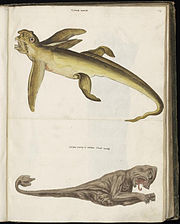List of cryptids
| Part of a series on the |
| Paranormal |
|---|
Cryptids are animals that cryptozoologists believe may exist somewhere in the wild, but whose present existence is disputed or unsubstantiated by science. Cryptozoology is a pseudoscience, which primarily looks at anecdotal stories, and other claims rejected by the scientific community. While biologists regularly identify new species following established scientific methodology, cryptozoologists focus on entities mentioned in the folklore record and rumor. Entities that may be considered cryptids by cryptozoologists include Bigfoot, Yeti, the chupacabra, the Jersey Devil, the Loch Ness Monster, and the Mokele-mbembe.
Scholars have noted that the cryptozoology subculture rejected mainstream approaches from an early date, and that adherents often express hostility to mainstream science. Scholars have studied cryptozoologists and their influence (including its association with Young Earth creationism),[1][2] noted parallels in cryptozoology and other pseudosciences such as ghost hunting and ufology, and highlighted uncritical media propagation of cryptozoologist claims.
List
Aquatic or semi-aquatic
| Name | Other Names | Description | Purported Location | Depiction |
|---|---|---|---|---|
| Cadborosaurus[3] | Caddy | Sea animal | Pacific Coast of North America | 
|
| Champ[4] | Champy | Lake monster | Lake Champlain, North America | 
|
| Cryptid Whales[5][6] | Giglioli's Whale, Rhinoceros dolphin, High-finned sperm whale, Alula whale, Unidentified beaked whales | Sea animal | Pacific Ocean, Atlantic Ocean, Indian Ocean | 
|
| Dobhar-chú[7] | Water Hound, King Otter | Extra-large otter-like carnivorous aquatic mammal | Ireland | 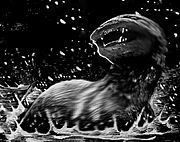
|
| Gloucester sea serpent[8] | Large serpent | Gloucester, Cape Ann | ||
| Iemisch[9] | Iemisch Listai | Mix of a jaguar and otter | Patagonia | |
| Igopogo[10] | Kempenfelt Kelly | Lake monster | Lake Simcoe, Ontario (Canada) | |
| Labynkyr Devil[11][12][13] | Labynkyrsky Chert[citation needed] | Lake monster | Oymyakonsky Ulus, Sakha Republic, Russia | |
| Loch Ness Monster[14] | Nessie | Lake monster | Loch Ness, Scotland | 
|
| Loveland Frog[15] | Loveland frogman, Loveland lizard | Humanoid frog | Loveland, Ohio | 
|
| Manipogo[16] | Winnipogo | Lake monster | Lake Manitoba, Canada | |
| Megalodon (surviving populations)[17][18][19] | Otodus megalodon[a] | Giant prehistoric shark | Oceans | 
|
| Mokele-mbembe[20] | Dinosaur (lake, river and/or swamp monster) | Republic of the Congo | 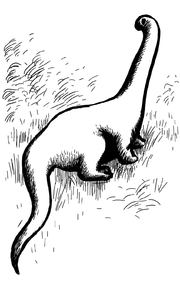
| |
| Ogopogo[4] | N'ha•a•itk, Naitaka | Lake monster | Lake Okanagan, Canada | 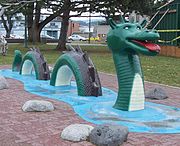
|
| Sea serpents[21] | Sea animals, dinosaurs | All bodies of water | 
| |
| Selma[22] | Seljordsormen | Lake monster | Lake Seljord, Telemark, Norway | |
| Steller's sea ape[23] | Sea animal | Pacific Ocean |
Terrestrial
| Name | Other names | Description | Purported location | Depiction |
|---|---|---|---|---|
| British big cats[24] | Alien big cats (ABCs), phantom cats, mystery cats, English lions, Beast of Bodmin, Beast of Exmoor |
Carnivorous mammal | Great Britain | 
|
| Chupacabra[25] | Chupacabras (Spanish for goat-sucker) | Puerto Rico (originally), South and Central America, Southern North America |
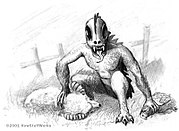
| |
| Dover Demon[26] | Dover, Massachusetts | 
| ||
| Lizard Man of Scape Ore Swamp[27] | Lizard Man of Lee County | Bipedal | South Carolina, United States | |
| Mapinguari[28] | Mapinguary | Giant Ground Sloth or primate | Amazons | 
|
| Michigan Dogman[29] | Humanoid dog | Wexford County, Michigan | ||
| Minhocão[citation needed] | Big Earthworm | Caecilian | South America | |
| Mongolian death worm[30] | Allghoi (or orghoi) khorkhoi | Worm-like animal | Gobi Desert (Asia) | 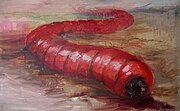
|
| Nandi bear[31] | Chemosit, Kerit, Koddoelo, Ngoelo, Ngoloko, Duba | Large carnivore | Eastern Africa | 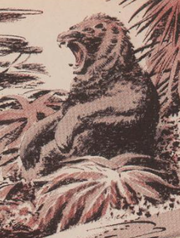
|
| Queensland Tiger[32] | Yarri | Large feline | Queensland | |
| Thylacine (surviving original populations)[33][b] | Tasmanian tiger. Tasmanian wolf | Carnivorous marsupial | Australia | 
|
| Name | Other names | Description | Purported location | Depiction |
|---|---|---|---|---|
| Almas[4] | Abnauayu, almasty, albasty, bekk-bok, biabin-guli, golub-yavan, gul-biavan, auli-avan, kaptar, kra-dhun, ksy-giik, ksy-gyik, ochokochi, mirygdy, mulen, voita, wind-man, Zana |
Non-human ape or hominid | Asia/Caucasus | |
| Amomongo[34] | Orang Mawas, Impakta | Ape or hominid | Negros Occidental, Philippines | |
| Barmanou[citation needed] | Barmanu, Big Hairy One | Ape or hominid | Middle East/Asia | |
| Bigfoot[35] | Sasquatch | Large and hairy ape-like creature | United States and Canada | 
|
| Bukit Timah Monkey Man[36] | BTM, BTMM | Forest-dwelling hominid or other primate | Singapore | |
| Chatawa Monster[37][38] | Large ape-like creature | Mississippi, United States | ||
| Chuchunya[39] | Large hominid | Russia | ||
| Fouke Monster[40][41] | Jonesville Monster, Southern Sasquatch, Boggy Creek Monster | Hominid or other primate | Arkansas, United States | |
| Honey Island Swamp monster[42] | Letiche, Tainted Keitre | Hominid or other primate | Louisiana, United States | |
| Orang Pendek | Small hominid | Sumatra | 
| |
| Nittaewo[43] | Nittevo | Small hominids | Sri Lanka | |
| Skunk ape[44] | Stink Ape, Myakka Ape, Myakka Skunk Ape | Primate | Florida, United States | 
|
| Yeren[45][44] | Yiren, Yeh Ren, Chinese Wildman | Primate (possible hominin) | China | |
| Yeti[46] | Abominable Snowman | Large and hairy human-like entity, various other descriptions | Himalayas (Asia) | 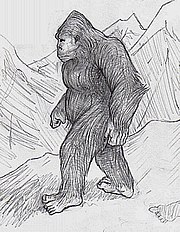
|
| Yowie[43] | Large and hairy human-like entity, various other descriptions | Australia | 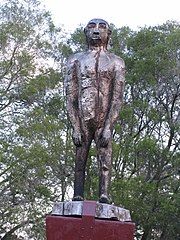
|
Flying
| Name | Other names | Description | Purported location | Depiction |
|---|---|---|---|---|
| Jersey Devil[14] | Leeds Devil | Winged bipedal horse | United States, mainly the South Jersey Pine Barrens, as well as other parts of New Jersey and southeastern Pennsylvania | 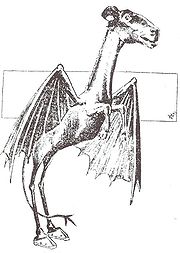
|
| Mothman[47] | Winged Man, Bird Man, UFO-Bird, Mason Bird Monster | Winged bipedal | Mason County, West Virginia, United States | 
|
| Rod[48] | Skyfish, Air Rod, Solar Entity | Small flying stick-like creatures | Worldwide | 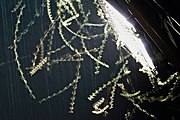
|
| Ropen[49] | Large bat-like creature or pterosaur | New Guinea |
See also
- Animalia Paradoxa
- Fearsome critters
- Legendary creature
- List of cryptozoologists
- Lists of legendary creatures
- List of megafauna discovered in modern times
- List of urban legends
- Rare species
Notes
- ^ Otodus is the currently accepted genus name for megalodon. Older sources refer to the genus as Carcharodon, Carcharocles, and several other names.
- ^ There is an ongoing de-extinction project to revive the species through genome editing, this entry refers to the possibility of surviving populations.
References
- ^ Hill, Sharon A. (2017). Scientifical Americans: The Culture of Amateur Paranormal Researchers. McFarland. p. 66. ISBN 9781476630823.
- ^ Card, Jeb J. (2016). "Steampunk Inquiry: A Comparative Vivisection of Discovery Pseudoscience". In Card, Jeb J.; Anderson, David S. (eds.). Lost City, Found Pyramid: Understanding Alternative Archaeologies and Pseudoscientific Practices. University of Alabama Press. p. 32. ISBN 9780817319113.
Creationists have embraced cryptozoology and some cryptozoological expeditions are funded by and conducted by creationists hoping to disprove evolution.
- ^ Loxton & Prothero 2013, pp. 261–295.
- ^ a b c Shermer, Michael; Linse, Pat (November 2002). The Skeptic Encyclopedia of Pseudoscience. Vol. 1. ABC-CLIO. p. 72. ISBN 9781576076538.
- ^ Mörzer Bruyns, W. F. J. (1971). Field guide of whales and dolphins. Rivonverhandeling. Tor. pp. 124–125. ISBN 978-90-70055-09-7
- ^ "Cetaceans with two dorsal fins" (PDF). Archived from the original (PDF) on 13 April 2023. Retrieved 7 January 2023.
- ^ "Ireland's hound of deep - Dobhar Chu". Irish Central News. Retrieved 19 December 2018.
- ^ Nicaise, Alexander (5 September 2019). "Gloucester Sea-Serpent Mystery: Solved after Two Centuries | Skeptical Inquirer". Retrieved 25 September 2023.
- ^ Gilmore, David D. (2003). Monsters : evil beings, mythical beasts, and all manner of imaginary terrors. Philadelphia: University of Pennsylvania Press. ISBN 978-0-8122-0322-6. OCLC 802059457.
- ^ "Welcome to Ogopogo Country - Canada's Lake Creature". epe.lac-bac.gc.ca. Retrieved 22 October 2024.
- ^ Lallanilla, Marc (4 February 2013). "Reports Surface of Monster Lurking in Russian Lake". livescience.com. Live Science. Archived from the original on 29 September 2021. Retrieved 21 March 2022.
- ^ "Divers preparing for icy waters of Russia's 'Loch Ness'". siberiantimes.com. The Siberian Times. 5 March 2014. Archived from the original on 28 January 2021. Retrieved 21 March 2022.
- ^ "Meet the creature found by divers in Russia's Loch Ness, famed for legends of monsters". siberiantimes.com. The Siberian Times. 21 April 2014. Archived from the original on 8 November 2021. Retrieved 21 March 2022.
- ^ a b Velasquez, S.J. (31 October 2015). "The monster you should never find". BBC Online. British Broadcasting Corporation. Retrieved 11 August 2018.
- ^ Haupt, R. (30 June 2015). "Skeptoid #473: The Loveland Frog". Skeptoid. Retrieved 1 September 2021.
- ^ Bernhardt, Darren. "Keep your camera handy: Stories of Manitoba lake monsters told for centuries but proof remains elusive". Canadian Broadcasting Corporation. Retrieved 29 June 2024.
- ^ Guimont, Edward (5 October 2021). "The Megalodon: A Monster of the New Mythology". M/C Journal. 24 (5). doi:10.5204/mcj.2793. ISSN 1441-2616. S2CID 241813307.
- ^ Rouner, Jef (8 August 2013). "Prominent Cryptozoologists Denounce 'Megalodon: The Monster Shark Lives'". Houston Press. Retrieved 31 October 2024.
- ^ Montgomery, Joy (7 June 2024). "How Megalodon Worked". How Stuff Works. Retrieved 31 October 2024.
Most scientists, paleontologists and other experts believe from the fossil evidence that megalodon became extinct over 2 million years ago during the Plio-Pleistocene period, but some cryptozoologists and researchers think that this giant shark may still exist in the undiscovered depths of the ocean… Proponents of the theory of megalodon's continued existence often point to eyewitness accounts to debate the possibility of the species' survival. Occasionally, a report will surface about a large, unidentified shark in the ocean, but those accounts have been mostly discounted as tall tales. Some researchers say that the discovery of new, unfossilized teeth proves that megalodon lives, but zoologist and cryptozoology expert Ben Speers-Roesch explains that these reports are erroneous and ignore the fact that no truly unfossilized teeth have ever belonged to megalodon.
- ^ Loxton & Prothero 2013, pp. 187–188.
- ^ Loxton & Prothero 2013, pp. 228–326.
- ^ Botsford, Flora (31 August 1999). "Secret life of the Norwegian Nessie". The Guardian. ISSN 0261-3077. Retrieved 30 June 2024.
- ^ Nickell, Joe (Winter 2016–2017). "Steller's Sea Ape: Identifying an Eighteenth-Century Cryptid". Skeptical Briefs. Vol. 26, no. 4. Committee for Skeptical Inquiry.
- ^ "Fantastic Cryptids And Where To Find Them". Forbes. Retrieved 18 December 2018.
- ^ Regal, Brian (15 October 2009). Pseudoscience: A Critical Encyclopedia: A Critical Encyclopedia. ABC-CLIO. ISBN 978-0-313-35508-0.
- ^ Sullivan, Mark (29 October 2006). "Decades later, the Dover Demon still haunts". The Boston Globe. Retrieved 6 August 2021.
- ^ Laycock, Joseph P. (11 July 2018). "A Search for Mysteries and Monsters in Small Town America". Smithsonian Magazine. Retrieved 18 March 2021.
- ^ "Twilight of the mammoths: Ice Age extinctions and the rewilding of America". Choice Reviews Online. 43 (8): 43–4679-43-4679. 1 April 2006. doi:10.5860/choice.43-4679. ISSN 0009-4978.
- ^ Hudson, Alison (28 July 2015). "Skeptoid #477: Wag the Dogman". Skeptoid. Retrieved 22 June 2017.
- ^ Benjamin Radford (21 June 2014). "Mongolian Death Worm: Elusive Legend of the Gobi Desert". livescience.com. Retrieved 22 October 2023.
- ^ Simpson, George Gaylord (1984). "Mammals and Cryptozoology". Proceedings of the American Philosophical Society. 128 (1): 1–19. ISSN 0003-049X. JSTOR 986487.
- ^ Smith, Malcolm (1996). Bunyips & bigfoots : in search of Australia's mystery animals. Alexandria, NSW: Millennium Books. ISBN 1-86429-081-1. OCLC 36719441.
- ^ Nickell, J., & RANDI, J. (2004). Cryptids “Down Under.” In The Mystery Chronicles: More Real-Life X-Files (pp. 289–295). University Press of Kentucky. http://www.jstor.org/stable/j.ctt2tv62q.39
- ^ "'Amomongo' frightens villagers in Negros". ABS-CBN News. Archived from the original on 27 February 2017.
- ^ Loxton & Prothero 2013, pp. 29–70.
- ^ "On the hunt for the elusive Bukit Timah Monkey Man". Channel NewsAsia. Archived from the original on 30 October 2018. Retrieved 18 December 2018.
- ^ "Chatawa—Indians weren't kidding about the sparkling water". Enterprise-Journal. 18 September 1985. p. 19. Retrieved 12 October 2024 – via Newspapers.com.

- ^ Grayson, Walt (17 July 2020). "Focused on Mississippi: Chatawa Monster". WJTV. Retrieved 12 October 2024.
- ^ O'Carroll, Eoin (28 September 2018). "Bigfoot and beyond: Why tales of wild men endure". The Christian Science Monitor. Retrieved 11 December 2018.
- ^ Dunning, B. (4 March 2014). "Skeptoid #404: The Boggy Creek Monster". Skeptoid. Retrieved 1 September 2021.
- ^ Thibodeau, Sunni (24 June 2001). "The Fouke Monster 30 Years Later: Ex-journalists recall sifting fact from Fouke fiction after sighting". Texarkana Gazette. Archived from the original on 3 August 2003. Retrieved 31 October 2024.
- ^ Frances, Leary (December 2003). "The Honey Island Swamp Monster: The Development and Maintenance of Folk and Commodified Belief Tradition" (PDF). pp. 4–6. Retrieved 18 March 2021.
- ^ a b Lack, Caleb W.; Rousseau, Jacques (8 March 2016). Critical Thinking, Science, and Pseudoscience: Why We Can't Trust Our Brains. Springer Publishing Company. p. 154. ISBN 978-0-8261-9426-8.
- ^ a b Lack, Caleb W.; Rousseau, Jacques (8 March 2016). Critical Thinking, Science, and Pseudoscience: Why We Can't Trust Our Brains. Springer Publishing Company. p. 170. ISBN 978-0-8261-9426-8.
- ^ "It's the monstrous new trend sweeping travel – what is cryptid-tourism?". Irish Examiner. Archived from the original on 4 October 2018. Retrieved 13 December 2018.
- ^ Loxton & Prothero 2013, p. 73.
- ^ Kantrowitz, Lia; Fitzmaurice, Larry; Terry, Josh (16 January 2018). "People Keep Seeing the Mothman in Chicago". Vice. Retrieved 26 April 2019.
- ^ "rods - The Skeptic's Dictionary - Skepdic.com". www.skepdic.com. Retrieved 20 September 2023.
- ^ "Don't Get Strung Along by the "Ropen" Myth".
Sources
- Loxton, Daniel; Prothero, Donald R. (2013). Abominable Science: Origins of the Yeti, Nessie, and other Famous Cryptids. Columbia University Press. ISBN 978-0-231-52681-4.
External links
 The dictionary definition of cryptid at Wiktionary
The dictionary definition of cryptid at Wiktionary Media related to Cryptozoology at Wikimedia Commons
Media related to Cryptozoology at Wikimedia Commons


